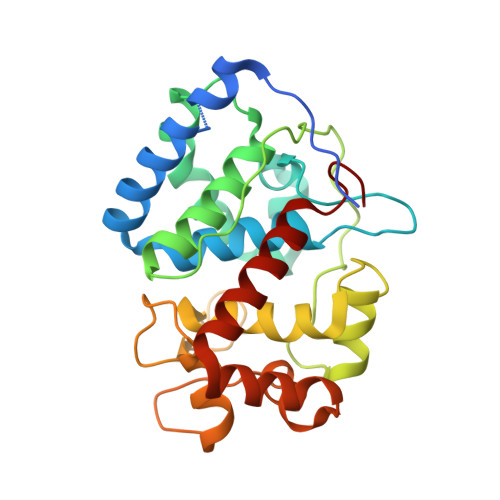The Tuberculosis Prodrug Isoniazid Bound to Activating Peroxidases.
Metcalfe, C.L., Macdonald, I.K., Murphy, E.J., Brown, K.A., Raven, E.L., Moody, P.C.E.(2008) J Biol Chem 283: 6193
- PubMed: 18056997
- DOI: https://doi.org/10.1074/jbc.M707412200
- Primary Citation of Related Structures:
2V23, 2V2E, 2VCF, 2VCN, 2VCS - PubMed Abstract:
Isoniazid (INH, isonicotinic acid hydrazine) is one of only two therapeutic agents effective in treating tuberculosis. This prodrug is activated by the heme enzyme catalase peroxidase (KatG) endogenous to Mycobacterium tuberculosis but the mechanism of activation is poorly understood, in part because the binding interaction has not been properly established. The class I peroxidases ascorbate peroxidase (APX) and cytochrome c peroxidase (CcP) have active site structures very similar to KatG and are also capable of activating isoniazid. We report here the first crystal structures of complexes of isoniazid bound to APX and CcP. These are the first structures of isoniazid bound to any activating enzymes. The structures show that isoniazid binds close to the delta-heme edge in both APX and CcP, although the precise binding orientation varies slightly in the two cases. A second binding site for INH is found in APX at the gamma-heme edge close to the established ascorbate binding site, indicating that the gamma-heme edge can also support the binding of aromatic substrates. We also show that in an active site mutant of soybean APX (W41A) INH can bind directly to the heme iron to become an inhibitor and in a different mode when the distal histidine is replaced by alanine (H42A). These structures provide the first unambiguous evidence for the location of the isoniazid binding site in the class I peroxidases and provide rationalization of isoniazid resistance in naturally occurring KatG mutant strains of M. tuberculosis.
Organizational Affiliation:
Department of Chemistry, University of Leicester, Lancaster Road, Leicester, United Kingdom.

















